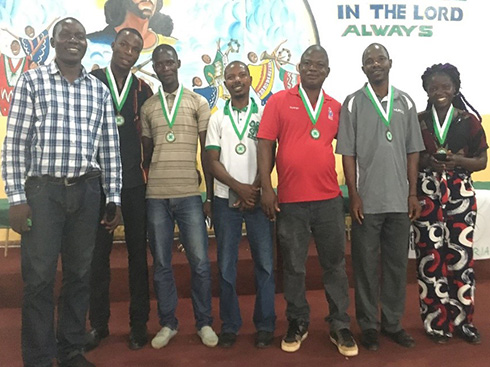4-H around the world: Liberia – Part 2
The series exploring 4-H around the world continues as we explore Part 2 of 4-H Liberia.

“4-H around the world: Liberia – Part 1” started the exploration of 4-H Liberia. G. Umaru Sheriff, National Executive Director, described how the 4-H programming looks in Liberia and some of the major activities. Part 2 is a continuation of the major 4-H Liberia activities featuring the National Agriculture Camp and Training of Agriculture Teachers.
National Agriculture Camp
Through the partnership with the United States African Development Foundation (USADF), 4-H Liberia had its first Agriculture Youth Camp Dec. 27-30, 2016. The camp was held in Montserrado County on the Ricks Institute campus with the theme “Agriculture Builds a Vibrant Nation.”
The objectives of the conference were to:
- Help young people see agriculture as a profitable business and viable livelihood by removing the stereotype that agriculture is a poor person’s job.
- Train young men and women in improved agricultural science and techniques they will use to impact other youth, parents and community leaders.
- Allow students to share ideas through communication and leadership training.
It brought together 68 4-H student leaders from Bong, Lofa, Gbarpolu, Margibi, Montserrado and Bomi counties. This event continues as 4-H Liberia had a successful agriculture fair and youth camp this summer 2018.
Training of Agriculture Teachers

Through the partnership with USADF and the Central Agriculture Research Institutes (CARI), 4-H Liberia trained 72 agriculture and general science instructors and six 4-H Liberia field officers in major vegetable production practices and crop post-harvest operations. The May 2015 training lasted for six days in Swakoko, Bong County. Forty-nine of the selected schools were public schools and 23 were private schools and mission schools from six counties (Gbarpolu, Bomi, Montserrado, Margibi, Bong and Lofa). The training was to be divided in two sections. Due to the coming of the rainy season and crops that needed to be planted before the heavy rains, CARI trained all of the 78 participants for one week.
My appreciation goes to Mr. Sheriff as a 4-H global network connection and providing the information for this article. 4-H is around the world making positive impacts on youth. It is also doing the same with adults!
Michigan State University Extension and the Michigan 4-H Youth Development program helps to prepare youth as positive and engaged leaders and global citizens by providing educational experiences and resources for youth interested in developing knowledge and skills in these areas.
To learn about the positive impact of Michigan 4-H youth leadership, citizenship and service and global and cultural education programs, read our 2016 Impact Report: “Developing Civically Engaged Leaders.” Additional impact reports, highlighting even more ways Michigan State University Extension and Michigan 4-H have positively impacted individuals and communities in 2016 can be downloaded from the MSU Extension website.
Find other global educational opportunities on the MSUE Global and Cultural Education website. For more information about 4-H learning opportunities and other 4-H programs, contact your local MSU Extension county office. If you would like to learn more about Michigan 4-H International Exchange Programs for hosting or travel, be sure and visit the website.



 Print
Print Email
Email

